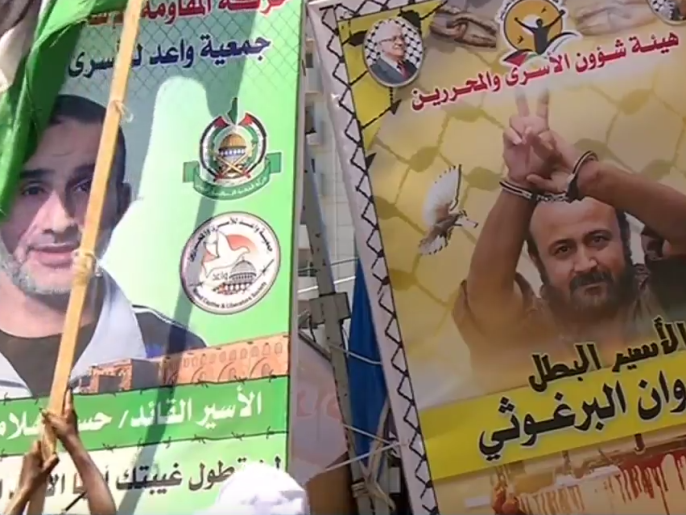David Hearst, editor-in-chief of the British Middle East Eye website, said that the two organizations, Hamas and Fatah, are running in the upcoming elections without an agreed vision of Palestine, and without a detailed plan to guarantee victory in the elections.
In an article published by the website entitled "The Palestine Elections ... A Leap into the Unknown for Fatah and Hamas", he believes that the President of the Palestinian Authority, Mahmoud Abbas, appears determined to win the elections this time, and among the measures that refer to this is the Palestinian Preventive Security Service and the Israeli occupation forces to arrest everyone Power candidates are opposed.
According to the Palestinian Prisoners' Club, the arrest campaign affected 456 Palestinian civilians last January in the West Bank, and 31 civilians were arrested in one night this month.
Dangerous escalation
The writer believes that the aim of these arrests is to spread terror in society, and that the charges against the detainees are vague, such as carrying out "terrorist activity, visiting a hostile country" or even "contacting foreign agents" at a time when those who are in charge of investigating the detainees leave no room for doubt as to the reason for their detention, which is Spreading fear in people's hearts.
"We are facing a serious and dangerous escalation, not only from the occupation, but also by the security services of the Palestinian Authority," Middle East Eye quoted Wasfi Qabha (the former minister of prisoners and a leader of the Hamas movement).
The minister said that the aim of the arrests campaign is to influence the elections and intimidate and intimidate Hamas members and sympathizers, adding that there are many people who have received arrest threats by the Israeli forces if they ran or participated in the elections.
The editor-in-chief of the site commented that the politically motivated arrests are not new in the West Bank, but what may come as a surprise to some is that the Hamas leadership in Gaza is still moving forward with its election plan despite the arrests campaign.
Hamas is divided
The writer said that despite the sympathy that Hamas enjoys due to the bad conditions and the siege imposed on the Gaza Strip, the movement’s leadership will face increasing pressure to withdraw from the elections that it cannot win, and no one expects the return of the 2006 elections that Hamas won.
In his article, he cited an example of the reactions that the Hamas leadership in Gaza would face regarding participation in the elections. Ibrahim Hamid, the former commander of the movement’s military wing in the West Bank during the Second Intifada, who is serving a 54-year prison sentence, described the decision of the Hamas political bureau to run in the elections as "hasty."
Hamid said - in a leaked letter from his prison - that the decision was taken without consulting the movement’s Shura Council, and without the prisoners ’knowledge, adding that running for elections would only serve Abbas’s goal of reviving his legitimacy in exchange for reducing Hamas’s legitimacy.
Palestinians raise the pictures of the imprisoned Fatah and Hamas leaders Marwan Barghouti and Hassan Salameh (Al-Jazeera)
Open deadlock
The writer says that Fatah is no better than Hamas, as Abbas's efforts to renew his mandate and seek to restore the legitimacy he lost as one of the architects of Oslo are threatened by two leaders in Fatah, Muhammad Dahlan (who is close to Israel) and Marwan Barghouti (who is in Israeli prisons).
He also believes that Abbas is aware of the plan he first disclosed in 2016 to replace him with Dahlan, which was drawn up in cooperation between the UAE, Jordan and Egypt for the post-Abbas era.
Since 2016, Cairo and Amman have not stopped pressuring the president of the Palestinian Authority to reconcile with Dahlan, and the last message in this regard reached Abbas when the heads of Egyptian and Jordanian intelligence visited Ramallah recently.
The writer notes that Barghouti, who spent nearly two decades behind bars, is seeking to get out of prison and run for elections, and that his announcement of his intention to run angered Fatah, as Jibril Rajoub, Secretary-General of the Movement's Central Committee, accused foreign countries of interfering in the Palestinian elections.
The editor-in-chief of Middle East Eye wonders whether Fatah seeks to liberate Palestine from occupation, or whether it seeks to rule on behalf of Israel, whatever the circumstances under which it is placed?
In light of the upcoming elections, he summarizes the Palestinian situation by saying that Fatah is still suffering from a crisis of legitimacy despite the fact that it considers itself the natural ruling power in the Palestinian territories. As for Hamas, it seeks to get rid of the heavy burden of responsibility for the two million Palestinians who live in poverty in Gaza.
Under these circumstances, it became clear that the upcoming Palestinian elections would be a leap into the unknown.

